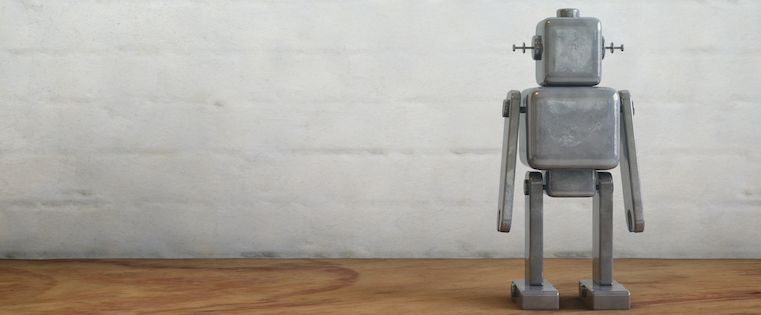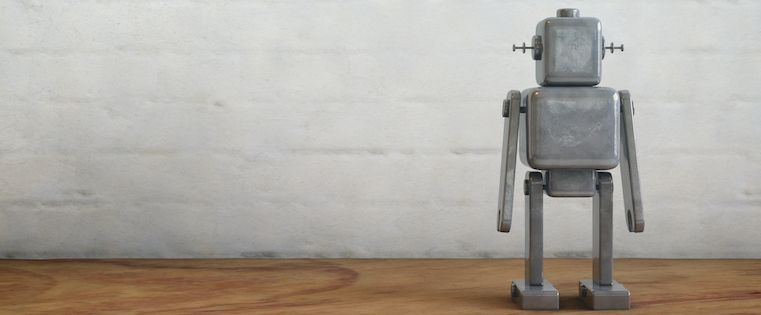10 Jobs Artificial Intelligence Will Replace (and 10 That Are Safe). The other day at work, my colleague, HubSpot Marketing Director Ryan Bonnici, sent around a link on Slack -- to a website called “Will Robots Take My Job?” We were thrilled to learn marketing managers had only a 1.4% chance of our jobs being automated or replaced by robots and artificial intelligence. The good news is; some jobs won’t be strictly replaced -- they just might be adjusted to account for new technologies’ “careers.” Based on the landmark 2013 study that inspired “Will Robots Take My Job?” we’ve rounded up some of the marketing and sales roles most likely to be replaced by robots, bots, and AI in the next few years. 10 Careers AI Will Replace (and 10 That Are Safe) Most Likely to Be Replaced 1) Telemarketers Likelihood: 99% Why: You probably already receive robo-calls on behalf of various products and services, and career growth in the telemarketing space is expected to decline by 3% by the year 2024. As companies grow in size -- especially across multinational markets -- a human and paper-based system can present more hurdles, time delays, and costs. 8) Market Research Analysts Likelihood: 61% Why: Market research analysts play an incredibly important role in the development of messaging, content, and products, but automated AI and surveys can compile this information more and more easily. 8) Software Developers Likelihood: 4.2% Why Not: Software engineering and development is hard enough for human beings to do, and the time and skill investment needed to create applications, software, and websites will be tough to replicate -- especially since developers need to execute perfectly to create great products for customers. While there is some software that can spot-check for clarity and scan for plagiarism, the editor role must be carried out by a human in order to read work as another human would. Like writing, all work needs to be original and created to the client's wishes, so graphic design needs to be created with a human artist and editor all-in-one. What jobs do you think will be replaced by AI?

The other day at work, my colleague, HubSpot Marketing Director Ryan Bonnici, sent around a link on Slack — to a website called “Will Robots Take My Job?”
We were thrilled to learn marketing managers had only a 1.4% chance of our jobs being automated or replaced by robots and artificial intelligence. And although I breathed a sigh of relief that writing has only a 3.8% chance of being automated, it made me think about job roles that weren’t so lucky.
If you think job disruption by AI is limited to the assembly lines, think again: AI is doing a better job than humans at some aspects of sales and marketing, too.
Artificial Intelligence Disruption is Already Happening
AI can analyze sales calls far faster than any sales manager could — in fact, it would take 9 years of nonstop sales call analysis for a human being to compete, and that’s if they didn’t take vacation or sleep. And AI is already being used to develop marketers’ content strategies and email marketing playbooks — it’s only a matter of time before it plays a bigger role in the process.
HubSpot co-founder and CTO Dharmesh Shah has a more positive outlook on the future of AI — in fact, he thinks bots and AI will make us better at our jobs and more secure in our careers, not the other way around.
The truth probably lies halfway between these camps — in many cases, AI will serve to make our jobs easier and will make us more effective and data-driven. But the fact remains that some jobs will be replaced by machines — it’s the essence of any industrial or technological revolution. The good news is; some jobs won’t be strictly replaced — they just might be adjusted to account for new technologies’ “careers.”
Based on the landmark 2013 study that inspired “Will Robots Take My Job?” we’ve rounded up some of the marketing and sales roles most likely to be replaced by robots, bots, and AI in the next few years. This study analyzes the likely probability that a job will be replaced by automation and computerization — based primarily on the level of routine a job has and the specialized training and social intelligence required to complete it. It’s not an exhaustive list, but it gives you an idea of what your life could look like in a few years.
10 Careers AI Will Replace (and 10 That Are Safe)
Most Likely to Be Replaced
1) Telemarketers
Likelihood: 99%
Why: You probably already receive robo-calls on behalf of various products and services, and career growth in the telemarketing space is expected to decline by 3% by the year 2024. This is largely in part because of the requirements to be successful: Unlike other sales roles, telemarketers don’t require a high level of social, or emotional, intelligence to be successful. Think about it — are you likely to purchase from a telemarketer? Conversion rates for direct telephone sales are typically less than 10%, making this role a ripe opportunity to be automated.
2) Bookkeeping clerks
Likelihood: 98%
Why: Jobs in this role are expected to decline 8% by 2024, and it’s no surprise why — most bookkeeping is becoming automated, if it hasn’t been already. QuickBooks, FreshBooks, and Microsoft Office already offer software that does the bookkeeping for you that’s much more affordable than a person’s salary, so it’s no surprise this job has such a high probability.
3) Compensation and Benefits Managers
Likelihood: 96%
Why: This one is surprising because the job growth is supposed to increase 7% by 2024. But just because there’s demand doesn’t make you safe from automation. As companies grow in size — especially across multinational markets — a human and paper-based system can present more hurdles, time delays, and costs. Automated benefits systems can save time and effort for providing benefits to large numbers of employees, and companies like Ultipro and Workday are already being widely adopted.
4) Receptionists
Likelihood: 96%
Why: Pam predicted this back on The Office, but in case you’re not a fan, automated phone and scheduling systems can replace a lot of the traditional receptionist role — especially at modern technology companies that don’t have…

COMMENTS